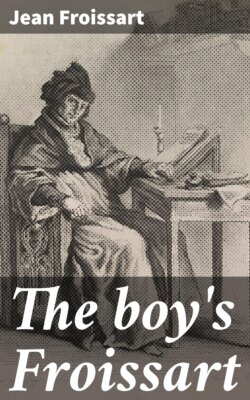Читать книгу The boy's Froissart - Froissart Jean - Страница 6
На сайте Литреса книга снята с продажи.
CHAPTER II.
How Earl Thomas of Lancaster, and Twenty-two of the greatest Nobles in England, were beheaded.
ОглавлениеTable of Contents
KING EDWARD THE SECOND, father to the noble King Edward the Third of whom our history speaks, governed his kingdom very indifferently by the advice of Sir Hugh Spencer, who had been brought up with him from his youth.
This Sir Hugh had managed matters so that his father and himself were the great masters of the realm, and were ambitious to surpass all the other great barons in England; for which reason, after the great defeat at Stirling, the barons and nobles, and even the council of the king, murmured much, particularly against Sir Hugh Spencer, to whom they imputed their defeat on account of his partiality for the King of Scotland. The barons had many meetings on this matter to consult what was to be done. The chief of them was Thomas, Earl of Lancaster, uncle to the king. Sir Hugh soon found it would be necessary for him to check them; and he was so well beloved by the king, and so continually in his presence, that he was sure of gaining belief, whatever he said. He soon took an opportunity of informing the king that these lords had entered into an alliance against him, and that, if he did not take proper measures, they would drive him out of the kingdom; and thus operated so powerfully on the king’s mind, that his malicious intentions had their full effect. The king caused all these lords to be arrested on a certain day when they were met together, and without delay ordered the heads of twenty-two of the greatest barons to be struck off, without assigning any cause or reason. Thomas, Earl of Lancaster, suffered the first. The hatred against Sir Hugh Spencer was increased by this deed, particularly that of the queen, and of the Earl of Kent, brother to the king; which when he perceived, he fomented such a discord between the king and the queen, that the king would not see the queen, or come to any place where she was. This quarrel lasted some time: when the queen and the Earl of Kent were secretly informed, that, if they did not speedily quit the court, they would repent it; for Sir Hugh was endeavoring to stir up much mischief against them. Then the queen, having made preparations for passing secretly to France, set out as if to go on a pilgrimage to St. Thomas of Canterbury; whence she went to Winchelsea, and that night embarked on board a vessel prepared for her reception, accompanied by her young son Edward, the Earl of Kent, and Sir Roger Mortimer. Another vessel was loaded with luggage, &c.; and, having a fair wind, they landed the next morning at Boulogne.
